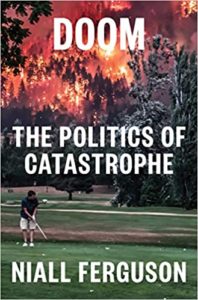Thinking Historically as History Unfolds

[Editor’s note: Read Part One and Two of Lynch’s review.]
At the beginning of Chapter 9, which finally marks the beginning of Ferguson’s writing on our current pandemic, the author claims that while he obviously cannot write the history of the crisis while it’s unfolding, “the act of thinking historically about an unfolding event is not without its value.” I hope you will forgive me if I admit to you that the first thought I had upon reading this sentence was, “well Niall, it certainly has value to you!” The value of this particular book project to the reader is an entirely different matter.
So what is the value here? What can we derive from this attempt to think historically about disasters, plagues, death, and destruction? It seems to me that there is some value if the reader does not approach this project as a book per se, because it isn’t really a coherent book-length project. It’s rather a mess. But within that mess there are some very interesting observations about the limits of politics, the challenges that crises present, and even how we as individuals reacted to the pandemic while it was happening. If you think about this book as a collection of essays, albeit disconnected, there are some things worth reading and other chapters best avoided.
For example, Chapter 9 was probably dated the moment the book was printed, and looks even more so now. Yes, the United States’ and United Kingdom’s initial responses to the pandemic were haphazard and cost lives; however looking at a still partially locked down and economically suffering China in 2022, one wonders if the Chinese leadership is simply forestalling the inevitable. Furthermore, writing when he did, Ferguson seems to ignore the public fatigue to draconian measures against a disease that even he acknowledges was deadly for a specific subset of folks (the elderly and those with co-morbidity). That fatigue eventually set in throughout the world.
Now contrast that rather dated chapter with one that has aged better: Chapter 10. In it, Ferguson reviews the economic consequences of the pandemic and lockdowns. He notes that the now widely dismissed and flawed model from the Imperial College London on the possible death rates of the COVID virus also ignored the social, economic, and political realities of human life. He notes that the excess death rates of the US and Sweden looked remarkably similar at the time, a fact that became clearer and clearer as time passed. Lockdowns didn’t seem to be helping control deaths, and they certainly made the collateral social and economic damage of the pandemic far worse. His review of the social unrest during the summer of 2020 is more uneven and now looks ready for a rehash, but his point about the partisan nature of the pandemic and response is dead-on, even if his social overview seems dated.
Whatever one thinks of Ferguson’s theories regarding empire and global hegemony, his penultimate chapter addresses how, at the time, he saw ever more clearly that the rising conflict between China and the US was the new Cold War. I don’t think I need to rub it in, but obviously Russia has messed this up for him. Pity the political prognosticator. While China has obviously sided with Russia in its invasion of Ukraine, one can’t look at current silly Chinese COVID policies and slowing economic growth and see the Chinese leadership as the same rising adversary that appeared to have handled the virus better than the US did. Furthermore, the relatively robust American and European response to helping Ukraine has probably given China more pause in gazing longingly at Taiwan as a future Hong Kong, particularly in light of the way Beijing has chosen to govern the territory. Any Western leader who doesn’t admit what will happen in Taiwan should China move against it will be hard pressed to explain why. So here again, Ferguson’s assertions and theories have not aged particularly well.
I guess if I had to sum up this review in a sentence it would be this – the first part of this book is much better than the latter parts of it, but the key takeaway is that Ferguson’s book has given us a way to understand how intellectuals and pundits were reacting to the pandemic in real time. If you want to revisit old discussions and debates from the lockdown period this book will revive old, probably unpleasant memories. What have we learned for the next great plague or disaster? This reviewer believes the main lesson from COVID was the need for political skepticism and a healthy dose of faith in individuals and markets creating wealth as a form of broad resilience; it’s not clear to me Ferguson highlights those factors enough.

